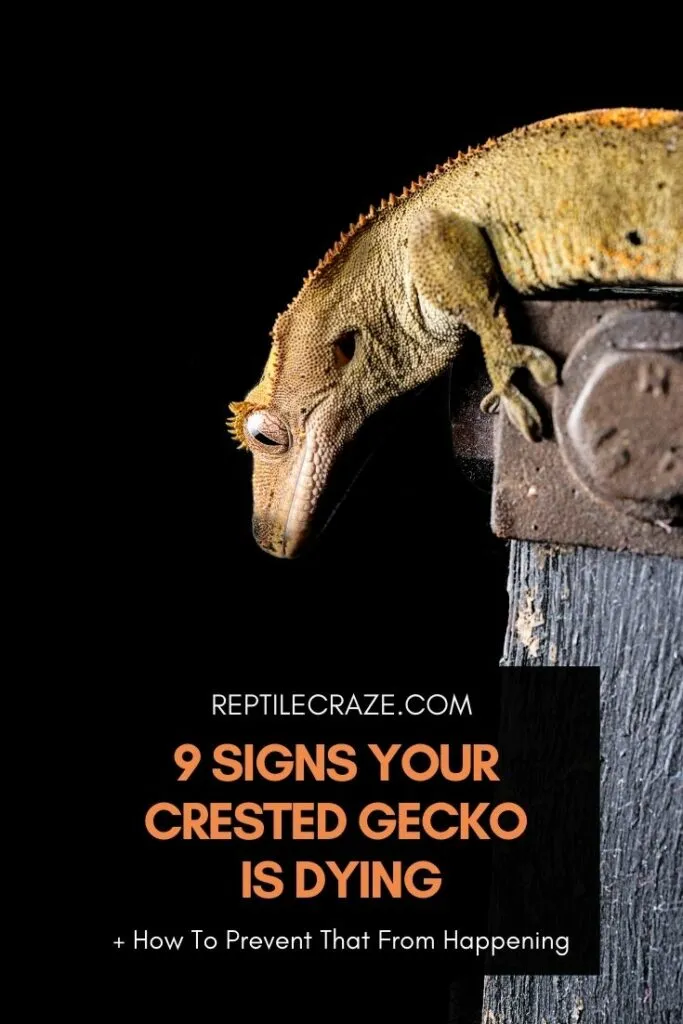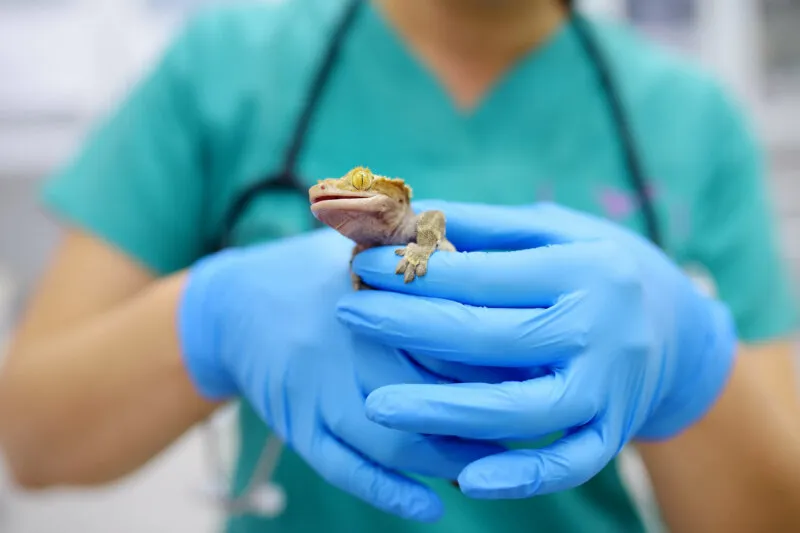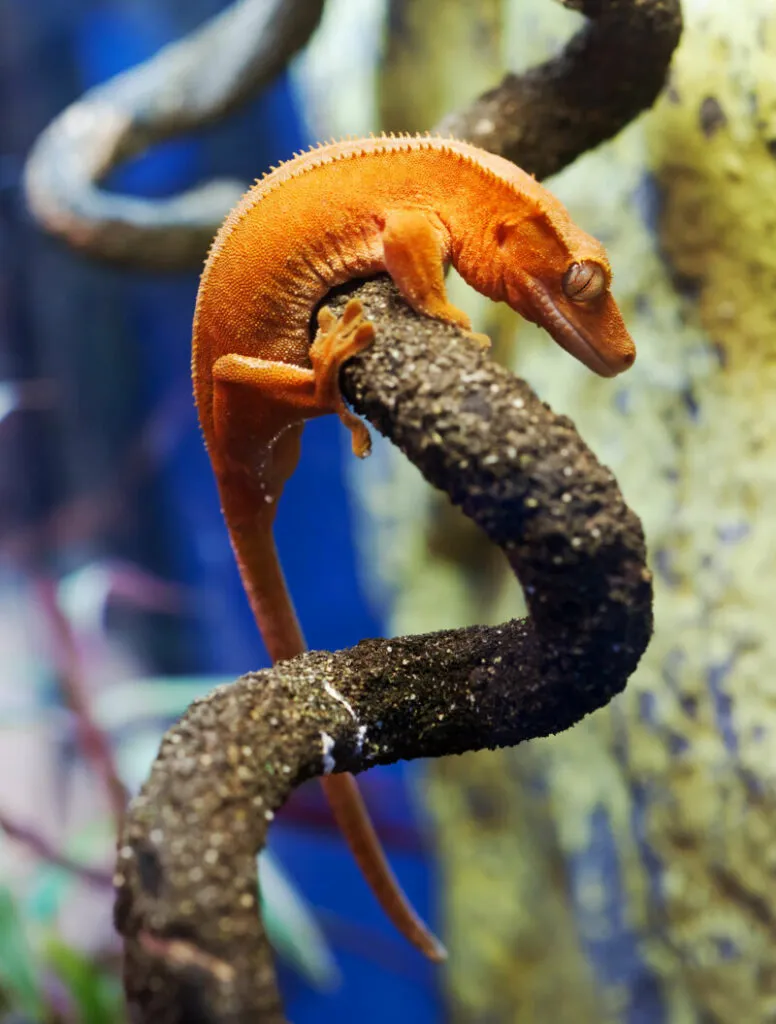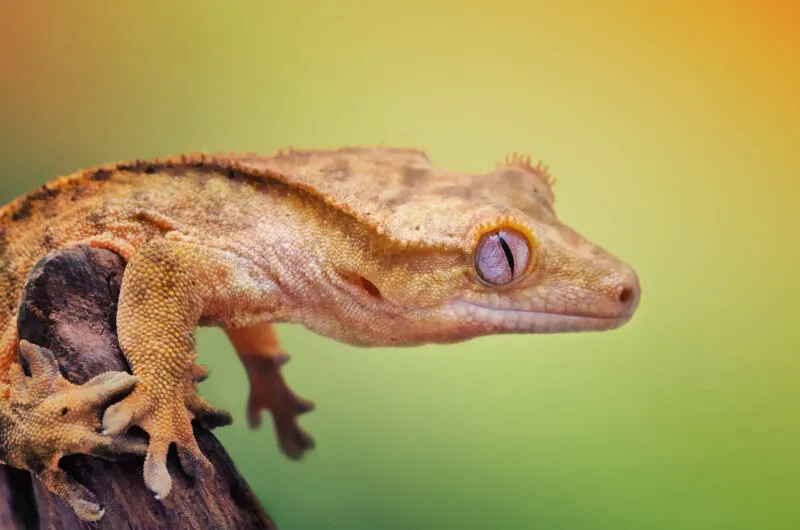
There’s nothing worse than seeing your crestie act out of sorts and wondering “is my crested gecko dying?”. Especially when you’re new to crested geckos, even simple behaviors like sleeping a lot can be thought to be a sign that your crestie is without a doubt at death’s door.
The top signs that your crested gecko may be dying, are:
- Staying on the cool side of the
tank - A loss of appetite
- Excessive basking
- Metabolic Bone Disease symptoms
- Lethargy
- Sudden weight loss
- Constipation or diarrhea
- Sunken eyes
- Fast or heavy breathing
In this article we’ll cover in detail:
- 9 top signs that your crested gecko is dying
- what to do when you spot these signs
- how to tell when your crestie has died, and what to do then
- what you can do to keep your crestie free from illness, and happy and healthy into old age.
Table of Contents
How Long Does A Crested Gecko Live?
A healthy crested gecko usually lives between 15 and 20 years. This lifespan is, however, dependent on different factors, for example, genetics, care, and diet.
The 9 Top Signs That Your Crested Gecko May Be Dying
Here are the top signs that can show that your crested gecko is dying. While any one of these signs doesn’t mean that your crestie is dying, a combination of them may be bad news for your crestie.
Staying On The Cold Side Of The Tank
Crested geckos are ectothermic, which means that they use their surrounding environment to regulate their body temperature.
A definite warning sign that something is wrong with the
A crested gecko staying on the cool side of the
If you suspect that the problem is with the
- Temperatures should range between 72°F at the cool end, and 85°F in the hottest part of the
tank (22°C and 30°C respectively) - The humidity in the
tank should be 50-55%.

A Loss Of Appetite That Can’t Be Explained By Brumation, Etc.
There are a variety of reasons why a crested gecko may stop eating that is completely normal. For example, they may have had a large meal previously and is skipping a meal because they don’t want to eat too much. (Now, if only that was possible with humans and chocolate!)
Brumation is also a time when crested geckos will stop eating. They’ll also stop eating a week or two before they start to brumate. This is completely normal and you also shouldn’t try to force them to eat during this time.
The reason why they stop eating before they brumate, is that they need to “clear out” their digestive system before starting their naptime. If they don’t do this, the
If your crested gecko keeps on skipping meals, however, there may be something else wrong and you need to take them to the vet. Not eating may also show that they are suffering from impaction, which may need to be resolved by a vet.
Note! You can try and ease a crested gecko’s impaction at home (by giving them a soak in lukewarm water), but if that doesn’t work, you need to get your crestie to the vet ASAP as impaction can kill them.
If you don’t live near a reptile vet, we highly recommend making use of veterinary telemedicine at Vetster! They offer 24/7 appointments and have fantastic service. Check out Vetster here!
Excessive Basking
On the other hand, excessive basking (staying in the hottest part of the
Common crested gecko parasites – infestations of which can easily turn deadly for your crestie – includes:
- Entamoeba invadens – This amoeba can lead to rapid weight loss in your crested gecko, but can be treated with metronidazole by a vet.
- Cryptosporidium – An infestation by this parasite isn’t curable and can lead to a type of wasting-disease. Treatable with paromomycin by a vet.
- Pinworm – Can be treated by a vet using Panacur, which is often successful. These worms can usually be spotted in the crested gecko’s feces.
Weak Bones, Swollen Limbs, And Other Symptoms Of MBD
One of the most devastating illnesses that reptiles like crested geckos can get, is metabolic bone disease (MBD). This sickness is caused by a lack of calcium in your crested gecko’s diet and is actually easy to prevent by making sure that you dust their feeder insects with a calcium powder (even when the feeders have been gutloaded).
Symptoms of metabolic bone disease include:
- trembling (this is one of the first signs)
- bowed legs
- limping
- a decreased appetite
- hard lumps along the spine, legs, or jaw
- a softening of the lower jaw (it can even seem more flexible).
In most cases, MBD leads to a prolonged death for the crested gecko and euthanasia may be a humane option, depending on how far the disease has progressed.
Lethargy That Can’t Be Explained By Brumation
There are various reasons why your crested gecko may be lethargic that has nothing to do with their winter brumation. One of the most common reasons for lethargy is dehydration.
Lethargy Due To Dehydration
Dehydration can happen quite quickly in crested geckos, and can kill if not treated in time. The common symptoms of dehydration include:
- sunken eyes
- lethargy
- wrinkly, dry skin
- tail waving (this is a sign that your crestie is distressed)
- sticky or dry membranes, causing your crestie to lick their eyes more often
- loss of appetite
Dehydration, if caught early, can be treated at home by giving your crested gecko a lukewarm bath and giving them a chance to drink some of the water as well. You can also simply mist the
However, if you’re worried at all about the level of dehydration, get your crested gecko to the vet rather.
Note! Don’t overdo the misting as too much humidity can be a breeding ground for germs that can infect your crested gecko and make them seriously ill or even kill them.
To keep your crested gecko hydrated, always make sure that they have fresh, clean water available. This means changing the water every day as well as washing the water bowl every day to ensure that any pathogens clinging to it have been removed.
Lethargy Due To Stress
Stress can also do a number on your crested gecko’s health. Stress can be caused by many different things, but the most common causes of stress are:
- they’re a new crestie and still getting used to their new surroundings
- there is a lot of noise and that scares them (noise caused by pets, people, music, etc.)
- too much handling – especially if you’ve just got them and they’re still getting used to you and their new forever home
- a wrong
tank setup regarding temperatures.
Lethargy Due To Injury Or Sickness
Another reason for a crested gecko’s lethargy is illness. This can be a symptom of a wide variety of diseases, from impaction, to parasites, mouth rot, metabolic bone disease, and more.
If you suspect one of the diseases named above (or any other disease), be sure to get your crested gecko to the vet as soon as possible in order that there’ll still be a chance for the vet to intervene and save your crestie.
When it comes to injuries, you can very carefully lift your crested gecko and look if you can see any injuries or bleeding. If you can’t, your crestie may have internal injuries.
If your crestie has taken a fall, a nasty bump, etc. it’s best to get them to the vet straight away than to wait to wait to find out whether or not they’ve sustained serious injuries.

Sudden Weight Loss
Sudden weight loss is never a good thing for a crested gecko – even while they are brumating. If you spot that your crestie is losing weight, you need to get to the bottom of the problem ASAP.
Reasons why your crested gecko may lose weight include:
- having some form of parasites
- not being able to eat because of impaction
- metabolic bone disease.
Because these are all dangerous conditions, you will need to get a vet to have a look at your crestie and even run some tests to find out, for example, what kind of parasites your crested gecko has.
Constipation (Impaction) Or Diarrhea
Both impaction – constipation – and diarrhea are very dangerous for your crested gecko and both can kill your crestie if given enough time. It’s therefore important that you treat impaction and diarrhea as quickly as possible.
Diarrhea is dangerous because it can let your crested gecko dehydrate rapidly. With this dehydration comes the other symptoms that we’ve already mentioned above.
However, your crestie isn’t just dehydrating when they suffer from diarrhea, but the pathogen that made them sick in the first place can remain in their body unless treated by a vet.
Note! Diarrhea can be caused by any number of diseases. However, because it is so dangerous, you should take your crested gecko – and a stool sample if possible – to your vet ASAP regardless of the cause.
Impaction, on the other hand, can be easier to treat and it can even be treated at home if it’s caught early enough.
Impaction can be caused, among other factors, by your crested gecko eating prey that are too large for them, eating substrate (more on this in a minute), or because of dehydration.
Note! Crested geckos usually eat substrate because they lack calcium in their diet. They eat the substrate – sand, for example – in order to try and get calcium and other minerals into their bodies.
By ensuring that your crestie gets enough vitamins and minerals in their diet, you’ll keep them from eating the substrate.
Sunken Eyes
Sunken eyes is a sure sign that something isn’t right with your crested gecko. While it’s a symptom of dehydration as we saw above, it can also point to other diseases or ill health. This includes sunken eyes being a symptom of metabolic bone disease.
As you might imagine, sunken eyes doesn’t mean that the dehydration is only slight. Sunken eyes should be taken seriously and your crested gecko should preferably be taken to a vet immediately.
Your crested gecko’s eyes (or one eye) may also appear sunken if it’s infected. An infection not caught in time and stopped with the professional help of a vet, can lead to your crestie dying.
If your crestie’s eye oozes puss it means that the infection is already severe and they need to be taken to the vet immediately before it starts to spread beyond the eye.
Fast Or Heavy Breathing
Fast or heavy breathing can be a sign of a respiratory infection. Your crested gecko’s rasping breathing may be accompanied by mucus draining from the nose. They may also breathe with their mouths open because they can’t breathe through their noses.
This struggle for air can quickly turn deadly as the infection worsens. As you can imagine, a vet would need to see your crested gecko as soon as possible when they present with the symptoms of a respiratory infection.
Other symptoms of a respiratory infection to watch out for, include:
- Weight loss
- Lethargy
- A loss of appetite
If you don’t take your crested gecko to the vet, you’ll definitely find that the infection gets worse. The worse the infection gets, the more weight loss and lethargy you’ll start to see in your crested gecko. Labored breathing will also worsen up to the point when the crestie dies.
What To Do When You Spot The Signs Of Your Crested Gecko Dying
First of all: don’t panic. Breathe.
Note! You have to act fast and, if you’re unsure whether a specific symptom is dangerous or not, rather play it safe and ask your vet for help. If you see that your crested gecko is in distress or is obviously sick, take them to the vet immediately.
If your crested gecko isn’t in distress, but still seems out of sorts, make a list of the symptoms that you can spot. For example, add that they are lethargic, and have skipped a couple of meals. Also, note how often/if they’re eating and if their poop is normal or not.
Keep adding to this list daily (or hourly if you’re very worried or the vet can’t see you immediately), adding the date and time.
This will give you and the vet a good overview of what is wrong. It’s all too easy to be stressed at the vet and forgetting half the symptoms!
If you find that your crestie is only getting ready to brumate – great! Otherwise, keep a close eye on them for a day or so. If they’re not getting better or you suspect impaction, you need to get them to the vet.
When To Take Your Crested Gecko To The Vet
Here’s a list of some of the main symptoms that are dangerous and will require a vet visit:
- constipation (not relieved by a lukewarm bath)
- diarrhea
- a broken limb or other signs of metabolic bone disease – don’t wait to get to the vet for this!
- trouble breathing/heavy breathing
- mucus coming out of the nose
- an infected eye/ an eye already oozing puss
- sores in or around the mouth
- sudden weight loss
- seeing worms in their feces
How To Tell When Your Crested Gecko Has Died
There are various ways to tell that your crested gecko has died. It’s very important that you make completely sure that they are in fact dead and not just sleeping or brumating!
Here are the signs that your crestie has died
- They aren’t breathing – when they’re brumating, they may be breathing slowly (even when just sleeping), so looking for other signs of death is important.
- Their pupils don’t respond to differences in light – you can use a small flashlight to make sure that their eyes are no longer responding.
- They don’t respond to touch or handling – when your crested gecko is brumating, they may take a few moments to respond to touch and handling. This is because you’re basically waking them up from a deep sleep. Even when they’re simply sleeping normally, they may take a few moments to start responding.
- They have a green-blue spot on their belly – The blue spot on their belly is bile leaking from the gallbladder and staining the tissues. However, this is only visible a couple of hours after your crestie has died. If you find them sooner, they won’t have this spot.
- Their mouth is sometimes open – Because the muscles are no longer keeping their mouth closed, their mouth may be open.
What To Do When Your Crested Gecko Has Died
When you’re sure that your poor crestie has passed on, you can either bury them if you have access to a garden and they died from old age.
However, if parasites or disease were involved, it’s best to take them to the vet to have them cremated in a safe and professional way. It may cost you more than just a burial, but then you can be sure that the disease can’t be passed on.
Should You Take Your Crested Gecko To The Vet When They’ve Died For Testing?
If you have other crested geckos or other reptiles, it’s imperative that you take your crestie and some of their feces (if possible) to the vet. The vet can then have a look and try and see what caused your crestie to die.
If your crested gecko died from an illness, you’ll have to take steps to ensure that the disease doesn’t spread to the other reptiles.
You will also need to clean the

How To Clean Your Crested Gecko’s Tank After They’ve Died
Although you’ve cleaned your crested gecko’s
In this part of the article, we’ll go through the cleaning step by step. To start off with, make sure that you have at least a disinfectant at hand. Ask your vet for the best product to use for cleaning, disinfecting, and sterilizing the
Substrate
This is the easiest part of the cleaning – the substrate should be gotten rid of. There’s no use in washing the substrate just to have germs still lurk within.
It will be much better in the long run to just get rid of the substrate now instead of infecting your new pet with the disease your crested gecko died of.
Hides
How the hides are cleaned will depend on what they’re made from. It will also depend on the texture of the hides. Hides that have a rough, stone-like texture will be more difficult to clean and sterilize than one that is smooth.
Use a new toothbrush to scrub any textures, cracks, and crevices with disinfectant.
If the hides are made from natural materials, rather get rid of them and get new ones. You should also get rid of any moss, etc. that you used in the cool hide to keep the air cool and humid.
Food and Water Bowls
Food and water bowls should at the least be sterilized. If this isn’t possible, rather replace them. This is because the water and
The pathogens can then remain on the bowls even after they’ve been washed but not disinfected or sterilized.
Other Tank Accessories
- Wood can be baked in an oven to kill any bacteria, etc. Just be careful not to roast it to charcoal!
- Anything that’s made of plastic should be sterilized to ensure that any pathogens are removed.
- Fabric (like hammocks) should be disinfected or sterilized and, if that’s not possible, it should be replaced.
Plants
- Fake plants should be washed and either disinfected, or sterilized.
- If you have real plants in the tank, you should rather replace them as it will be very difficult to completely rid them of pathogens without killing them.
Tips On How To Keep Your Crested Gecko Free From Illness
- Spot clean their
tank on a daily basis and remove any feces and uneatenfood . - Clean their whole
tank each week and deep clean theirtank once a month to ensure that there are no build-up of pathogens that may make your crested gecko sick. - Always gut feed your crested gecko’s live
food and dust them with calcium powder. This will ensure that they get enough calcium to keep them from getting MBD. - Feed your crested gecko a wide variety of foods to ensure they get as much nutrients as they need to stay healthy.
- Interact with your crestie and build a bond with them. What fun is having a pet if you only stare at them all day long?
- Make sure that their
tank is always set up correctly and that thetank is in a quiet place where they won’t be stressed by people, pets, or noise. - Your vet is your friend – take your crestie for their check-ups to ensure that they’re in tip top shape.
Conclusion
And there you have it. Not all signs that your crested gecko is dying actually means that they will die. Keep a clear head and keep a close eye on your crestie and you’ll be surprised how healthy your crested gecko is and how long your crestie will live.
Again, when in doubt, bring your crestie to a vet immediately. If there is no exotic vet in your area or if you would like to avoid unnecessary trips, book an online vet here.
- Eastern Rat Snake: Nature’s Pest Control and Fascinating Reptile - September 20, 2024
- Eastern Racer: The Fast and Agile Snake - September 19, 2024
- The Eastern Indigo Snake: The Majestic, Non-Venomous Hunter of the Southeast - September 18, 2024
